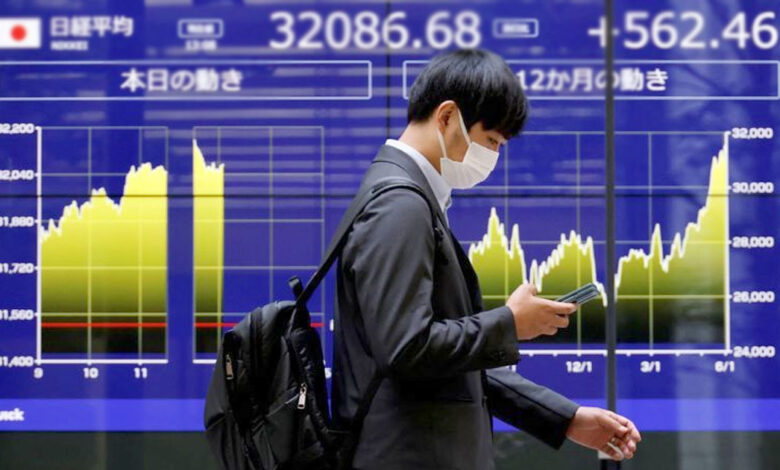Asian stocks falter as traders anxiously await Federal Reserve’s interest rate decision

Asian shares stumble as Bank of Canada rate hike raises concerns about Fed rates
Asian stocks declined on Thursday following a surprising interest rate hike by the Bank of Canada, reigniting worries that the Federal Reserve may maintain a hawkish stance during its upcoming meeting.
MSCI’s broadest index of Asia-Pacific shares outside Japan fell by 0.48%, while Japan’s Nikkei dropped 1%. Australia’s S&P/ASX 200 index also saw a slight decline of 0.29%.
The negative sentiment is expected to carry over to European markets, with Eurostoxx 50 futures down 0.30%, German DAX futures falling 0.31%, and FTSE futures showing a 0.06% decrease.
The Bank of Canada surprised the markets on Wednesday by raising its overnight rate to a 22-year high of 4.75%. Traders anticipate another rate hike next month to cool down an overheating economy and combat persistently high inflation.
This move by the Bank of Canada follows Australia’s unexpected interest rate hike earlier this week. The Reserve Bank of Australia subsequently cautioned about the possibility of further rate increases to address mounting inflationary pressures.
Tapas Strickland, head of market economics at NAB, noted that these actions by the Bank of Canada and the Reserve Bank of Australia indicate that central banks are not finished with the tightening cycle. The upcoming U.S. Consumer Price Index (CPI) report will be crucial in determining whether the Federal Reserve proceeds with a rate hike in June, as previously signaled.
The CPI data, scheduled for release on Tuesday, is expected to reveal a 0.30% increase in prices for May.
Market expectations for the Federal Reserve to maintain the status quo next week have decreased to 64%, compared to 78% just a day earlier, according to the CME FedWatch tool. Traders are now pricing in a 25 basis point rate hike in July.
While economists surveyed by Reuters anticipate that the Fed will not raise rates at its June meeting, a significant minority expects at least one more hike later this year.
China shares dipped by 0.12%, while Hong Kong’s Hang Seng Index fell 0.57%.
Data released on Wednesday showed a 7.5% year-on-year slump in China’s May exports, the largest decline since January and well below the 0.4% decline predicted by analysts. This weak export performance has prompted observers to anticipate potential policy stimulus measures.
Treasury yields remained steady during early Asian trading hours, after surging following the Bank of Canada’s decision.
The yield on 10-year Treasury notes increased by 1.1 basis points to 3.795%, while the yield on the 30-year Treasury bond rose by 0.5 basis points to 3.947%.
The two-year U.S. Treasury yield, which typically reflects interest rate expectations, was up 1.7 basis points at 4.567%.
In the currency market, the dollar index, which measures the U.S. currency against six major peers, experienced a slight decline of 0.038%, with the euro rising 0.09% to $1.0707.
The yen strengthened by 0.22% to 139.80 per dollar after revised data showed that Japan’s economy grew more than initially estimated in January-March.
The Canadian dollar edged up by 0.08% to 1.34 per dollar, while Turkey’s lira reached a record low against the dollar as the newly re-elected government seemed to relax stabilizing measures after signaling a shift towards more orthodox policies.
U.S. crude futures declined by 0.22% to $72.37 per barrel, while Brent crude stood at $76.76, down 0.25% for the day.
Gold prices stabilized on Thursday after experiencing a 1% drop in the previous session, with spot gold increasing by 0.3% to $1,945.89 per ounce.





